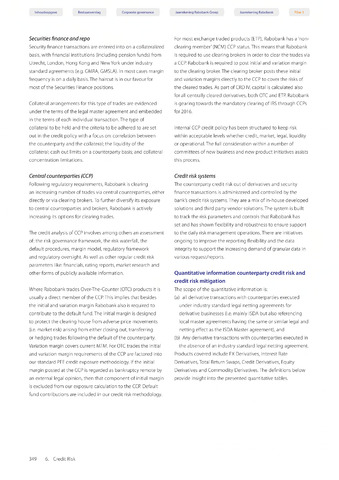Inhoudsopgave Bestuursverslag Corporate governance
Securities finance and repo
Security finance transactions are entered into on a collateralized
basis, with financial institutions (including pension funds) from
Utrecht, London, Hong Kong and New York under industry
standard agreements (e.g. GMRA, GMSLA). In most cases margin
frequency is on a daily basis.The haircut is in ourfavourfor
most of the Securities Finance positions.
Collateral arrangements for this type of trades are evidenced
under the terms of the legal master agreement and embedded
in the terms of each individual transaction. The type of
collateral to be held and the criteria to be adhered to are set
out in the credit policy with a focus on: correlation between
the counterparty and the collateral; the liquidity of the
collateral; cash out limits on a counterparty basis; and collateral
concentration limitations.
Central counterparties (CCP)
Following regulatory requirements, Rabobank is clearing
an increasing number of trades via central counterparties, either
directly or via clearing brokers. To further diversify its exposure
to central counterparties and brokers, Rabobank is actively
increasing its options for clearing trades.
The credit analysis of CCP involves among others an assessment
of: the risk governance framework, the risk waterfall, the
default procedures, margin model, regulatory framework
and regulatory oversight. As well as other regular credit risk
parameters like: financials, rating reports, market research and
other forms of publicly available information.
Where Rabobank trades Over-The-Counter (OTC) products it is
usually a direct member of the CCP. This implies that besides
the initial and variation margin Rabobank also is required to
contribute to the default fund.The initial margin is designed
to protect the clearing house from adverse price movements
(i.e. market risk) arising from either closing out, transferring
or hedging trades following the default of the counterparty.
Variation margin covers current MTM. For OTC trades the initial
and variation margin requirements of the CCP are factored into
our standard PFE credit exposure methodology. If the initial
margin posted at the CCP is regarded as bankruptcy remote by
an external legal opinion, then that component of initial margin
is excluded from our exposure calculation to the CCP. Default
fund contributions are included in our credit risk methodology.
Jaarrekening Rabobank Groep Jaarrekening Rabobank
For most exchange traded products (ETP), Rabobank has a 'non-
clearing member'(NCM) CCP status.This means that Rabobank
is required to use clearing brokers in order to clear the trades via
a CCP. Rabobank is required to post initial and variation margin
to the clearing broker. The clearing broker posts these initial
and variation margins directly to the CCP to cover the risks of
the cleared trades. As part of CRD IV, capital is calculated also
for all centrally cleared derivatives, both OTC and ETP. Rabobank
is gearing towards the mandatory clearing of IRS through CCPs
for 2016.
Internal CCP credit policy has been structured to keep risk
within acceptable levels whether credit, market, legal, liquidity
or operational. The full consideration within a number of
committees of new business and new product initiatives assists
this process.
Credit risk systems
The counterparty credit risk out of derivatives and security
finance transactions is administered and controlled by the
bank's credit risk systems.They are a mix of in-house developed
solutions and third party vendor solutions.The system is built
to track the risk parameters and controls that Rabobank has
set and has shown flexibility and robustness to ensure support
to the daily risk management operations.There are initiatives
ongoing to improve the reporting flexibility and the data
integrity to supportthe increasing demand of granular data in
various request/reports.
Quantitative information counterparty credit risk and
credit risk mitigation
The scope of the quantitative information is:
(a) all derivative transactions with counterparties executed
under industry standard legal netting agreements for
derivative businesses (i.e. mainly ISDA but also referencing
local master agreements having the same or similar legal and
netting effect as the ISDA Master agreement), and
(b) Any derivative transactions with counterparties executed in
the absence of an industry standard legal netting agreement.
Products covered include FX Derivatives, Interest Rate
Derivatives,Total Return Swaps, Credit Derivatives, Equity
Derivatives and Commodity Derivatives.The definitions below
provide insight into the presented quantitative tables.
349 6. Credit Risk

